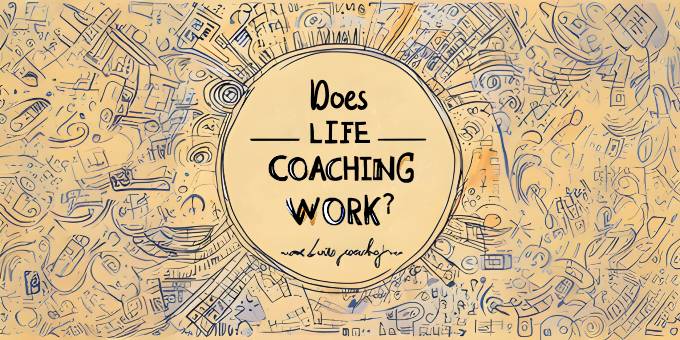
Does life coaching work? Life coaching has become increasingly popular and the industry is growing, but where’s the evidence that it works?
Originally published 8 January 2021. Extensively updated 8 May 2024
Have you been thinking about getting a life coach but not sure if it would work for you?
Customer reviews and testimonials from satisfied clients are great, but presented by themselves don’t provide sufficient evidence for the effectiveness of a coaching program.
A life coach could have great testimonials from 10 clients, but not disclose another 50 who weren’t happy with their coaching. So how do you know if life coaching works?
What is life coaching?
There’s no universally accepted definition of what life coaching actually is. Wikipedia defines life coaching as “the process of helping people identify and achieve personal goals through developing skills and attitudes that lead to self-empowerment. Life coaching generally deals with issues such as procrastination, fear of failure, relationships, lack of confidence, work-life balance and career changes, and often occurs outside the workplace setting”.
Although this is a pretty good summary of what life coaching involves, there can be many other aspects to it, and different coaches have different specialties and approaches – sometimes wildly different.
For example, there are so-called “psychics” who call themselves life coaches, and at the other end of the scale, some life coaches are high-level management experts, ex-CEOs or clinical psychologists.
Life coaching has become increasingly popular over the past 30 years. According to a 2023 International Coaching Federation study, active coach practitioners generated an estimated annual revenue from coaching of over US$4.5 Billion.
Even through the Covid pandemic, the coaching profession continued to expand at pace. In 2022, the estimated number of coach practitioners exceeded 100,000 for the first time, a 54% increase on the 2019 global estimate.
The vast majority of coaches hold a degree-level qualification or higher, including 30% with a bachelor’s degree and 65% with a more advanced degree.
Although the industry is still unregulated, 85% of coaches hold a certification or credential from a professional coaching organisation. In addition, 95% of surveyed coaches had completed over 60 hours of training.
What methods do life coaches use?
An important aspect to consider is the different coaching models and resources used, and how valid and effective they are.
Given the broad scope of what life coaching is, who calls themselves a life coach, the methods they use, and the desired outcomes of the person being coached, the question “Does life coaching work?” becomes too broad.
To answer this question as best I can, I need to define some parameters, and look at what the evidence tells us about the efficacy of coaching.
Some life coaches use a non-scientific approach called Neuro-Linguistic Programming (NLP) that claims to help clients through re-programming of behavioural patterns. Although it’s still quite popular, its use is declining and there is currently no good evidence for its efficacy.
The evidence for the use of hypnotherapy as being effective for a variety of issues is patchy at best, and for the purposes of this article I’ll disregard the myriad “new age” concepts out there such as crystal healing, astrology, reiki, etc.
The use of positive psychology principles
Coaching usually doesn’t involve therapy or counselling as such, but most coaches, myself included, do employ various positive psychology concepts as part of our practice.
A significant aspect of many life coaching programs involves looking at your mindset, and finding ways to build healthy thinking patterns and beliefs that help you manage stress and anxiety, build resilience, and be the best version of yourself so you can reach your goals.
Cognitive Behavioural Coaching and similar approaches stemming from the positive psychology field have been shown to be effective in improving your overall wellbeing, as well as helping you to reach your goals.
Cognitive Behavioural Coaching (CBC) uses similar psychological principles to Cognitive Behavioural Therapy (CBT) and Acceptance Commitment Therapy (ACT). However, CBC sessions are not therapy, and not about getting over past trauma.
Rather, they involve nurturing self-talk habits that get you thinking more rationally and constructively, allowing you to move forward in a positive and practical way.
This is achieved through deep discussion with you, identifying and minimising thought patterns that are unhelpful or detrimental, and encouraging and maximising thought patterns that are helpful and empowering.
Cognitive Behavioural Coaching involves understanding the link between events in your life, your thoughts and beliefs about those events, and the consequences of those thoughts and beliefs – the action or inaction you take, the behaviours you exhibit, and the resulting outcomes.
A skilled coach will guide you through this process of discovery with care and without judgement. A high level of trust and coach competence is required.
Mindfulness has also been shown to have many mental health benefits, and many coaches, myself included, now incorporate mindfulness concepts into our practices.
On a fundamental level, mindfulness merely means paying attention to the present moment. Meditation is a form of mindfulness, but by no means the only way to practice it, and it doesn’t suit everyone.
You can be mindful in any situation: in a meeting, at a party, playing sport, reading, watching TV, etc.
The more ‘mindful moments’ we have during the day, the happier we are overall.
Regularly practising mindfulness can help to reduce stress and anxiety and increase overall wellbeing – all of which are desired outcomes of most coaching programs.
The use of management principles
In addition to addressing negative emotional states such as stress, anger and anxiety, and building confidence and resilience using positive psychology and mindfulness models, life coaching usually involves building useful personal skills derived from management and professional development theory.
A variety of practical strategies taken from the corporate world can be applied to your specific needs. For example, coaching clients are often looking to improve in such areas as:
- Communication
- Leadership
- Procrastination
- Motivation
- Clarity & direction
- Goal setting
- Habit building
- Planning
- Time management
- Career progression
These areas and others such as health & fitness and lifestyle may form part of your desired outcomes from a life coaching program.

Does life coaching work? Here’s what the evidence tells us…
Getting back to the question of “Does life coaching work?”… for our purposes, let’s look at the available evidence for the efficacy of Cognitive Behavioural Coaching, and personal coaching generally.
Management expert and author Mike Clayton wrote about Cognitive Behavioural Coaching in 2018, saying the stoics of the 3rd century BC “pretty much nailed it”, and all we’ve been doing is adding layers ever since.
He says Cognitive Behavioural Coaching is one of those layers that is truly helpful.
How do we know this?
Research supports the effectiveness of coaching
It’s difficult to find good studies on life coaching interventions outside of the workplace setting, no doubt due to the challenges of carrying out thorough independent analyses of an inherently personal circumstance where confidentiality is paramount.
There would also be a challenge in obtaining large data sets to work from. It’s much easier to conduct studies from within organisations, where coaching interventions tend to be more structured, and there is more recorded data to work with.
Let’s look at the research most closely aligned with the methods used and desired outcomes of life coaching.
A 2023 meta-analysis study in the Journal of Rational-Emotive & Cognitive-Behaviour Therapy concluded that Cognitive Behavioural Coaching brings high-level improvements on performance and low to medium improvements on abilities, affect, and cognition.
It also found that Cognitive Behavioural Coaching is effective regardless of the method or format of delivery.
This meta-analysis is the first one to synthesise the efficacy of Cognitive Behavioural Coaching in order to document its impact and potential moderators. CBC has so far positive results on different types of outcomes, but we need more rigorous studies in the field.
An earlier meta-analysis conducted by Jones, Woods and Guillaume in 2016 and published in the Journal of Occupational and Organisational Psychology looked into the effects of Cognitive Behavioural Coaching for individuals within an organisational context.
They found that workplace coaching has measurably positive effects on emotional outcomes, skill-based outcomes and individual-level outcomes.
Additionally, a 2023 meta-analysis of randomised controlled trials of workplace coaching from the Academy of Management Learning and Education found clear and new evidence of the efficacy of coaching in a variety of applications.
The International Association of Cognitive Behavioural Coaching concluded in 2018 that “the effects of cognitive behavioural coaching are strongly validated by research and such interventions provide benefits for both organisations and individuals“.
Another meta-analysis of 18 studies by University of Amsterdam psychologists Theebooma, Beersma and Annelies in 2014 published in the Journal of Positive Psychology investigated the relationship between various coaching interventions and individual outcomes.
What they found was that coaching has significant positive impacts on all the outcomes they measured: performance and skills, wellbeing, coping, work attitudes and goal-directed self-regulation.
A more specific 2016 study by Losch, Traut-Mattausch, Muhlberger and Jonas published in Frontiers of Psychology compared the effectiveness of individual coaching, self-coaching and group training on reducing procrastination and achieving goals.
In a randomised controlled study, they found that “individual coaching created a high degree of satisfaction and was superior in helping participants attain their goals“.
In addition, they concluded that “the results for the self-coaching condition show that independently performing exercises without being supported by a coach is not sufficient for high goal attainment“.
Finally and more broadly, an International Coach Federation Global Coaching Client Study conducted independently by PricewaterhouseCoopers found that “80% of people who receive coaching report increased self-confidence, and over 70% benefit from improved work performance, relationships, and more effective communication skills.”
Should you get a life coach?
Although more studies specifically around life coaching outside of the workplace setting would be desirable, we can see that there’s very good evidence of Cognitive Behavioural Coaching and one-on-one coaching in general having overall positive benefits for people in many different areas of work and life.
So if you’re thinking about working with a life coach to help you overcome obstacles, gain confidence and achieve your goals, chances are it’s going to work for you.
A good professional coach should be able to provide at least some evidence of their own program’s success.
Do your research, ask questions, go with someone you trust, and put the work in. It could be the best decision you ever make.
What do you think? Let me know in the comments below.
Copyright © 2021-2024 Eclipse Life Coaching Ltd

Thanks for this Kris, something I had been meaning to do myself. You have saved me a lot of time. Now I can just share the link 🙂
You’re welcome Rachel! Thanks for commenting.
Your article is very informative Kris. Does life coaching work? What is the proof here? The data you are sharing on this topic is very important.
Thanks Reece. Much appreciated!